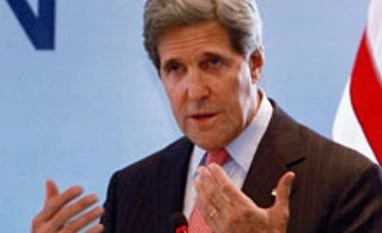The Obama Administration today cautioned the Assad regime not to retaliate against its military strike, warning that it would regret if it tried to escalate it.
"Let me say again unequivocally, bluntly: If Assad is arrogant enough and foolish enough to retaliate to the consequences of his own criminal activity, the United States and our allies have ample ways to make him regret that decision without going to war," Kerry told lawmakers during a Congressional hearing.
"Even Assad supporters, Russia and Iran, say publicly that the use of chemical weapons is unacceptable. And guess what? Even Iran and Syria itself acknowledge that these weapons were used. They just pretend that the other guys, who don't even have the capacity to do it, somehow did it," he said, testifying before the House Foreign Affairs Committee.
"This is not the time to be spectators to slaughter. This is not the time to give permission to a dictator, who has already used these weapons, the unfettered ability to continue to use them because we stepped back. Neither our country nor our conscience can afford the cost of silence or inaction," he said.
Presenting a strong case for a military strike against the Assad regime of Syria, the Defence Secretary, Chuck Hagel, said if Assad is prepared to use chemical weapons against his own people, the US has to be concerned that terrorist groups like Hezbollah, which has forces fighting in Syria supporting the Assad regime could acquire them and use them.
"This risk of chemical weapons proliferation poses a direct threat to our friends and partners and to US personnel in the region. We cannot afford for Hezbollah or any terrorist groups determined to strike the United States to have incentives to acquire or use these chemical weapons," he said.
"The Syrian's regime's action threatens to erode the nearly century-old international norm against the use of chemical weapons, a norm that has helped protect United States forces and our homeland," Hagel added.
The objective of these military strike, he said, is to hold the Assad regime accountable, degrade its ability to carry out these kind of attacks, and deter the further use of chemical weapons.
"The Department of Defense has developed military options to achieve these objectives, and we have positioned US assets throughout the region to successfully execute the mission. We believe we can achieve them with a military action that would be limited in duration and scope," he said.
"Let me say again unequivocally, bluntly: If Assad is arrogant enough and foolish enough to retaliate to the consequences of his own criminal activity, the United States and our allies have ample ways to make him regret that decision without going to war," Kerry told lawmakers during a Congressional hearing.
"Even Assad supporters, Russia and Iran, say publicly that the use of chemical weapons is unacceptable. And guess what? Even Iran and Syria itself acknowledge that these weapons were used. They just pretend that the other guys, who don't even have the capacity to do it, somehow did it," he said, testifying before the House Foreign Affairs Committee.
More From This Section
Kerry asserted that this is not the time for armchair isolationism.
"This is not the time to be spectators to slaughter. This is not the time to give permission to a dictator, who has already used these weapons, the unfettered ability to continue to use them because we stepped back. Neither our country nor our conscience can afford the cost of silence or inaction," he said.
Presenting a strong case for a military strike against the Assad regime of Syria, the Defence Secretary, Chuck Hagel, said if Assad is prepared to use chemical weapons against his own people, the US has to be concerned that terrorist groups like Hezbollah, which has forces fighting in Syria supporting the Assad regime could acquire them and use them.
"This risk of chemical weapons proliferation poses a direct threat to our friends and partners and to US personnel in the region. We cannot afford for Hezbollah or any terrorist groups determined to strike the United States to have incentives to acquire or use these chemical weapons," he said.
"The Syrian's regime's action threatens to erode the nearly century-old international norm against the use of chemical weapons, a norm that has helped protect United States forces and our homeland," Hagel added.
The objective of these military strike, he said, is to hold the Assad regime accountable, degrade its ability to carry out these kind of attacks, and deter the further use of chemical weapons.
"The Department of Defense has developed military options to achieve these objectives, and we have positioned US assets throughout the region to successfully execute the mission. We believe we can achieve them with a military action that would be limited in duration and scope," he said.
)